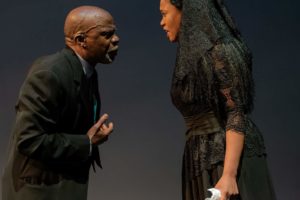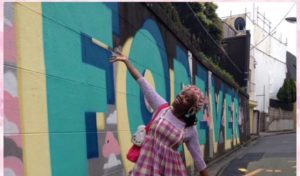A Message from a Black Mother to Her Son
Dear Caleb,
When you were almost 2, we would drop off your cousin, Sydney, at her K-8 elementary school. The ritual went something like this:
“OK, Syd, have a good day.”
“OK,” she’d groan as she grabbed her backpack. “Bye, Caleb.”
“Bye,” you’d wave and grin with your entire body.
“Bye,” Sydney would say one last time as she shut the door. I’d roll down the car window.
“Byeeeee,” you’d sing.
“Bye,” Sydney would laugh as she caught up with friends.
I’d roll up the window as you said “bye” a few more times, then start to whimper. “It’s OK, sweetie, she’ll be back before you know it. And you’ll be off joining her before I know it.”
And it’s true. Before I know it, Caleb, you will be throwing your backpack on and waving goodbye as you run off across the playground. I think about that moment often and wonder about the condition of schools you’ll enter. I worry about sending you, my black son, to schools that over-enroll black boys into special ed, criminalize them at younger and younger ages, and view them as negative statistics on the dark side of the achievement gap.
Son, my hope for you is that your schooling experiences will be better than this, that they’ll be better than most of mine.
For three years of my K-8 schooling, from 7:40 a.m. until 3:05 p.m., I was black and invisible. I was bused across town to integrate a white school in Southeast Portland, Ore. We arrived at school promptly at 7:30 and had 10 full minutes before the white children arrived. We spent that time roaming the halls—happy, free, normal. Once the white children arrived, we became black and invisible. We were separated, so that no more than two of us were in a class at a time. I never saw black people in our textbooks unless they were in shackles or standing with Martin Luther King Jr. Most of us rarely interacted with a black adult outside of the aide who rode the bus with us. I liked school and I loved learning. But I never quite felt right or good. I felt very black and obvious because I knew that my experience was different from that of my peers. But I also felt invisible because this was never acknowledged in any meaningful way. I became visible again at 3:05 when I got back on the bus with the other brown faces to make our journey home.
Caleb, I want your teachers to help you love being in your skin. I want them to make space for you in their curricula, so that you see yourself as integral to this country’s history, to your classroom’s community, to your peers’ learning. I want your teachers to select materials where blacks are portrayed in ordinary and extraordinary ways that actively challenge stereotypes and biases. Most of all, Caleb, I want your teachers to know you so they can help you grow.
One day a teacher was trying to figure out why I was so angry since I was generally a calm, fun-loving kid. She said to me: “I know you, Dyan. You come from a good family.” But did she know me? She knew that I lived on the other side of town and was bused in as part of the distorted way that Portland school authorities decided to “integrate” the schools. But did she know what that meant? My mom—your grandma—got us up at 6 a.m. in order for me to wash up, boil an egg just right, fix my toast the way I liked it, and watch the pan of milk so that it didn’t boil over, so I could have something hot in my stomach before going to school. You know Grandma, she doesn’t play. We had to eat a healthy breakfast before going to school, and we had to fix it ourselves. Maybe that’s what that teacher meant by “good family.” My teacher didn’t know that we had to walk, by ourselves, four blocks to the bus stop and wait for the yellow bus to come pick us up and take us to school. It took us a half hour to get to school. Once there, I had to constantly code switch, learn how not to be overly black, and be better than my white counterparts.
Caleb, I want your teachers to know your journey to school—metaphorically and physically. I want them to see you and all of your peers as children from good families. I don’t want you to have to earn credit because of whom you’re related to or what your parents do for a living. And I don’t want your teachers to think that you’re special because you’re black and have a family that cares about you and is involved in your life. I want them to know that all children are part of families—traditional or not—that help shape and form who they are.
The summer before beginning 4th grade, I started teaching myself how to play the clarinet. It was the family instrument in that both of my older sisters played it when they were younger. For years I wanted to be a musician. It was in my blood. My grandfather was a musician, all of my uncles can sing very well, and my dad—your grandfather—was a famous DJ in Jamaica once upon a time. At the end of 5th grade, my band director took each member aside to provide feedback on whether or not she or he should continue music in middle school. My teacher told me that I just didn’t have it and should quit. I was devastated. I had dreams of becoming a conductor and I loved playing music. I learned to read music and text at the same time before entering kindergarten, so I couldn’t understand what my teacher saw or heard that made him think that I, at the tender age of 11, didn’t have what it took to pursue playing in a middle school band. He knew nothing about me. Had never asked any questions about me, our family, my aspirations. He didn’t seek to make me a better musician.
Caleb, I hope that you will have teachers who realize they are gatekeepers. I hope they understand the power they hold and work to discover your talents, seek out your dreams and fan them, rather than smother them. I hope they will see you as part of a family, with gifts and rich histories that have been passed down to you. I hope they will strive to know you even when they think they already know you. I hope your teachers will approach you with humility and stay curious about who you are.
When I was in 4th grade, my elementary school held a back-to-school night that featured student work and allowed families to walk the halls and speak with teachers. In each classroom was a student leader, chosen by teachers. I’m not sure what my role was supposed to be. But at one point, a couple came in, desiring to speak with Mrs. S. She was busy, so I thought I’d chat with them while they waited. As I approached them, they recoiled in fear and, with panicked looks, turned away from me and said, “Mrs. S.?” My teacher looked away from the folks she was working with and said, “It’s OK, she’s not like the rest.” I don’t remember what happened next. All I remember is that this seemed to be one of the first in a long line of reassurances that I was special and not like other black boys and girls. For many years afterward, I was told on more than one occasion, “You’re not like other blacks.” This was supposed to be a compliment.
Caleb, I pray that your teachers will not look at you through hurtful racial preconceptions. I pray that they will do the work necessary to eliminate racist practices in themselves and in those around them. I pray that they stand up for you in ways that leave you feeling strong and capable. I pray that they will nurture your spirit, and that you, in turn, will desire to be a better you.
Son, I end this letter by sharing a story that Grandma has told me many times, that I hope will one day resonate with you. On the first day of kindergarten, many of the kids were crying and clinging to their parents. But not me. I was ready! I wanted to be like my three older siblings and go to school. So I gave my mom a hug, let go of her hand, waved goodbye, and found my teacher. And remember how I told you that my oldest sister taught me how to read before I went to school? The teacher found this out and used this skill, along with my desire to be at school, to teach the other kids the alphabet and help them learn how to read. I believe, in part, that is why I became a teacher. She saw something in me and encouraged me to develop my passion—even at this young, sweet age.
That, my son, is my hope for you. I hope your teachers will love you for who you are and the promise of what you’ll be.
Love,
Mama
Dyan Watson (watson@lclark.edu) is an assistant professor in the Graduate School of Education and Counseling at Lewis & Clark College in Portland, Ore. She is an editorial associate of Rethinking Schools and co-editor of Rethinking Elementary Education.

 Previous Post
Previous Post Next Post
Next Post




